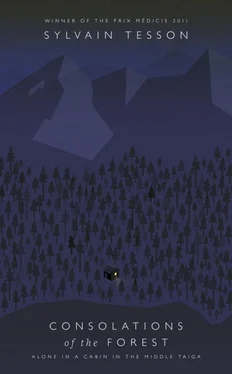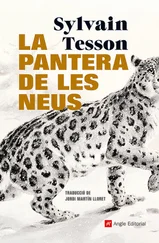Lena stands up to send a message on the radio, saying: ‘If I miss three check-in times in a row, it means I’m dead.’
I leave her, fortified in my love for Russia, a nation that sends rockets into space and where people fight off wolves with stones.
After walking a good mile over sheets of lunar ice that resemble huge jellyfish veined with turquoise, I reach the station at Pokoyniki, where Sergei and Natasha live. Sergei has prepared a banya. We suffocate there for an hour. Then we empty a bottle of honey-flavoured vodka, not forgetting to toast the ladies, because 8 March, that’s the day men buy themselves a good conscience on the cheap.
9 MARCH
At noon, Sergei opens a three-litre bottle of beer. On the label, it says Siberian Size .
For five years I dreamed about this life. Today, it feels like an ordinary accomplishment. Our dreams come true but only as soap bubbles fated to burst.
10 MARCH
I set off for Ujkani. The island lies nineteen miles east of Pokoyniki, out in the middle of the lake. From a distance, it looks like a felt hat sitting on the horizon. The wind is from the north-west. I push on like a maniac, eating up the miles on this lake of frosted glass. A fish swims beneath the ice. We are a world apart. To me, the fish seems imprisoned, cut off from the sky by an impenetrable lid; it’s heartbreaking. Sometimes I lie down on a snow bank to look at the hygienically blue sky through the oval frame of my furry hood. My little sledge holds me back, but when boosted by a gust of wind it shoots past me and I have to lean back to stop it. I reach the island in six hours.
The lord and master around here is Yura. He lives with his wife in a weather station on a steep flank of the island: four large izbas, facing west. He has the despotic character of island hermits, the ‘King of Clipperton syndrome’, [6] Named after John Clipperton, an English pirate and privateer, Clipperton Island is an uninhabited and largely barren coral atoll of only 3.5 square miles in the eastern Pacific Ocean. In 1906 the British Pacific Island Company built a guano mining settlement there, installing one Lieutenant Arnaud as Governor of Clipperton and its colony of soldiers, their families, and sixty Italian workers. The First World War and the Mexican Revolution made the resupplying of the island by ship impossible, but when a US navy warship arrived to evacuate the island, Arnaud and some thirty colonists refused to leave. By 1917 scurvy and an ill-fated attempt to leave the island in a small boat had left only one man alive there, the lighthouse keeper, Victoriano Álvarez, who proclaimed himself King of Clipperton and began terrorizing the remaining women and children through rape and murder. When the USS Yorktown checked the atoll on 18 July 1917, they found the surviving women and children and the corpse of Álvarez, whom Arnaud’s widow had killed in self-defence the day before with a hammer.
which becomes tinged with madness when vodka lights its fire in his eyes. He reigns unchallenged in his satrapy. In the outposts of Baikal the authority of Moscow holds hardly any sway. A tacit contract does link the government to its reclusive citizens: the former sends not a single rouble in subsidy payment, while the latter cheat, lie and scrounge all they can.
11 MARCH
I spend a whole day on Ujkani Island half asleep. The Siberian sun warms the façade of the izba and light pours into my room. Lying on my bed, I read a French translation of Jünger’s Journal Vol. 1, 1965–1970. The old magus would not have liked the brightness here; too raw, it kills the mystery of things. The faded eyes of seers are more at home in half-tones. I gather images from every page, flashes, visions. Jünger expresses through symbols the metaphysics of the physical world:
p. 27: Common progress consists of the quantification of things and human beings, translated into numbers.
p. 66: Human beings must be viewed as semaphores, bearers of signs.
p. 119: Here dwell gods whose names I need not know, and who lose themselves, like trees in the forest, in the Divine-in-itself.
p. 164: A single day in Ceylon… Perhaps it would be better, instead of allowing ourselves to be dragged from temple to temple, to pay our respects to a few ancient trees.
p. 199: Demythologizing aims to render people and their conduct submissive to the laws of the world of machines.
p. 266: The less we cling to differences, the more intuition comes to our aid; we no longer hear the rustling of the tree but the whole forest’s answer to the wind.
p. 353: Entrance fee. Even better, quite often, is the exit fee, the price we pay to have nothing whatsoever to do any more with society.
p. 366: Increasing haste is a symptom of the transmutation of the world into numbers.
p. 519: And one day, bees discovered flowers and moulded them to their caresses. Ever since, beauty has filled more space in the world.
Where does it come from, my love for aphorisms, witticisms and a nicely turned phrase? And my preference for the particular over the collective, individuals over groups? From my name? Tesson : ‘shard’, a fragment of something that once was. Its shape conserves the memory of the bottle. A ‘Tesson’ would be a creature nostalgic for a lost unity, seeking to rejoin the All. Which is what I’m doing here, getting drunk in the woods.
Yura is tending to his chores. He will never return to the city. On the island, he enjoys the two ingredients necessary for an unencumbered life: space and solitude. In the city, the human crowd can survive only if its excesses are curbed and its needs regulated by law. When men crowd together, administration is born. An equation as old as the first Neolithic hamlet and illustrated in every human collectivity. For the hermit, administrative rule begins with another person. Then it’s called marriage.
Men of the forest are very sceptical about projects for ‘citizen cities’, self-governed, no prisons or police, where triumphant liberty shall suddenly reign among crowds now perfectly well behaved. These loners detect a grotesque paradox in such utopias: the city is an inscription in space of culture, order – and their natural child, coercion.
Only withdrawal to a boundless and barely populated wilderness validates a pacifist anarchy founded on this simple principle: in contrast to urban life, danger in the woods arises from nature, not man. The idea of majority rule that governs human relations may therefore fail to reach such distant regions. Let’s daydream a little. We might imagine for our Western societies small groups of people, like those in Pokoyniki or Zavorotni, who are eager to peel off from the parade of progress. Tired of overpopulated cities where governance implies the promulgation of ever more abundant rules, hating the administrative hydra, outraged by the intrusion of new technologies into every aspect of daily life, anticipating the spread of social and ethnic chaos fostered by the growth of mega-regions, these groups decide to abandon urban zones and return to the woods. They would re-create villages in forest glades among towering trees. They would invent a new life. This impetus would be related to the hippie movement, but draw strength from different motives. The hippies fled an order that oppressed them. The neo-foresters will flee a disorder that demoralizes them. As for the woods, they are ready to welcome pilgrims, being used to the eternal return.
To attain a sense of inner freedom, one must have solitude and space galore. Add to these the mastery of time, complete silence, a harsh life and surroundings of geographic grandeur. Then do the maths, and find a hut.
12 MARCH
I leave the island behind. I sleepwalk the nineteen miles back to Pokoyniki in seven hours. I spend the afternoon on a bench near Sergei’s cabin, motionless and muffled up like a little old man. A little old man who just tossed off nineteen miles in twenty-four-below-zero weather.
Читать дальше












